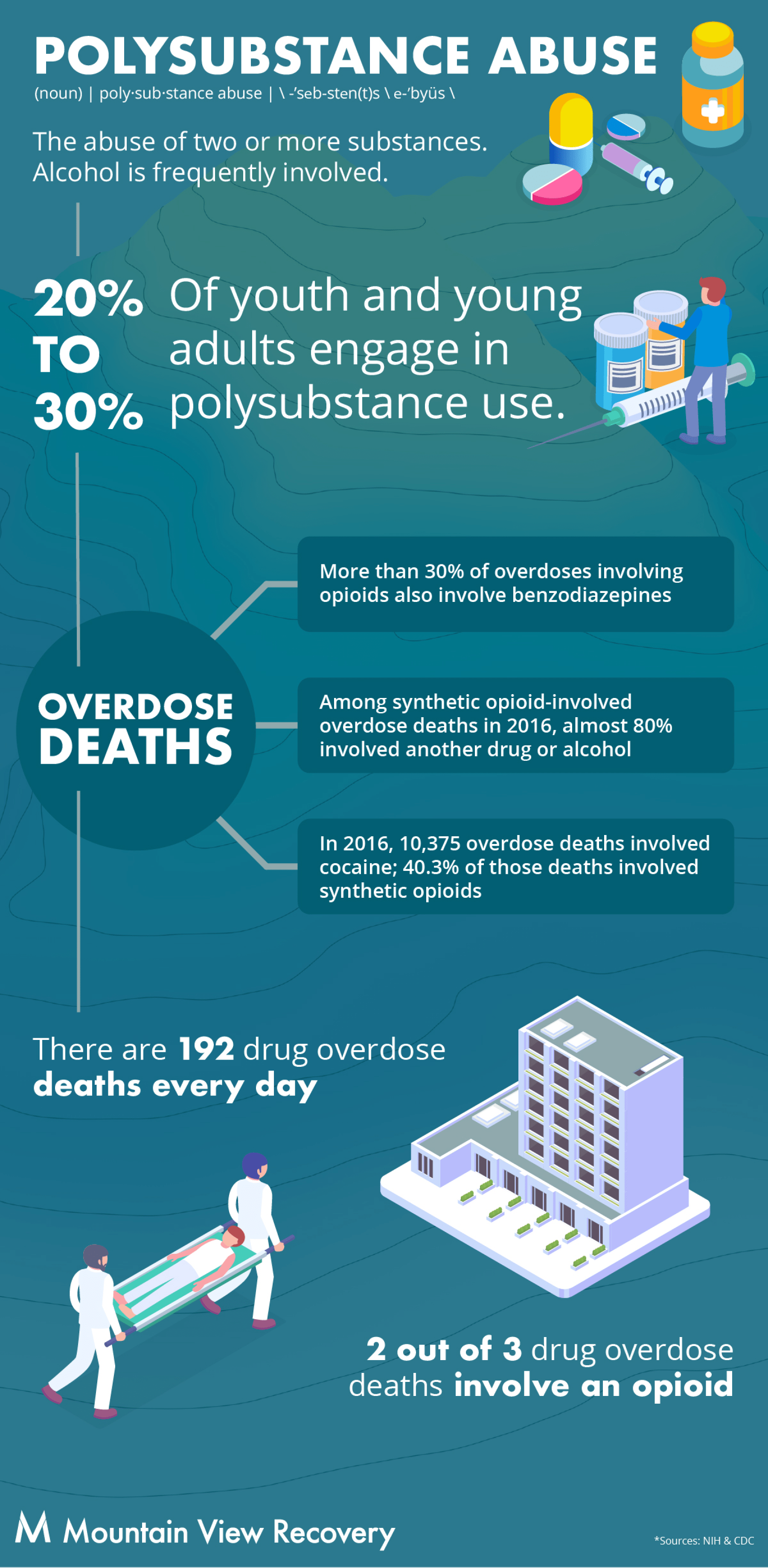What is Polysubstance Abuse?

Dangers Of Polylsubstance Abuse
Often when someone intentionally mixes substances they are typically hoping to enhance the side effects of both substances and/or to negate negative effects of any of the substances. Alcohol is a central nervous system (CNS) depressant. It does have some stimulating effects, but by depressing the CNS it slows breathing and impairs motor and cognitive function among other side effects. Mixing alcohol with other substances that also act as CNS depressants is incredibly dangerous.

MountainView Recovery
5475 Mark Dabling Blvd #102
Colorado Springs, Co 80918
Contact Us Today!
MountainView Resources!
Beyond the known effects, polysubstance drug use is dangerous for the unpredictability. All substances, including legal drugs and alcohol, have the potential for negative side effects. It depends on the frequency of use, amount of use, individual body factors, and so much more. According to SA Health, “…the more alcohol in the body, the less heroin needed to cause an overdose.” Polysubstance use is always a serious and deadly risk.
Mental Health And Polysubstance Abuse
It is not unusual to see mental health issues with addiction issues. With polysubstance use, there is an even greater potential for mental health issues or mental illness. According to the National Institutes of Health (NIH),
“Compared to users of a single drug, polysubstance users are more likely to present with comorbid mental health conditions, misuse or abuse prescription drugs, are at a greater risk for other health complications, and are more likely to report higher ratings on the Addiction Severity Index.”
For anyone dealing with mental health issues and addiction, it is important to seek treatment that addresses all issues. Some people will have mental health issues prior to any problems with addiction. They may use substances as a way to cope. Alternatively, substance abuse and addiction might bring about or worsen mental health issues. It is important to receive treatment that helps identify and address each issue. In fact, while some debate this, the government does classify addiction as a mental illness. There are innumerable circumstances that contribute to addiction. From the NIH, “In 2014, 20.2 million adults in the U.S. had a substance use disorder and 7.9 million had both a substance use disorder and another mental illness.” Addiction and mental illnesses are common. No one should feel ashamed or let that get in the way of seeking help.
Treatment
Addiction to multiple substances and any mental illness, or mental health problems, do make treatment more complicated. However, it is not impossible. It is just important to find a treatment center that is capable of treating all issues individually but also as a whole. Contact us today for more information and help.

Mountain View Recovery Treatment Programs
Patient Resources
Addiction is complex, which means treatment and long-term recovery are complex. Despite this, it shouldn’t scare anyone – patients or their loved ones. It just means that treatment and recovery both require thorough and thoughtful planning.
Outpatient Program
Our outpatient program (OP) is a transition preparatory phase. It provides a minimum of nine (9) hours of weekly outpatient treatment. This involves a minimum of one (1) hour/s individual substance abuse/behavioral health counseling per week.
Adventure Therapy
For a long time, nature has been seen as a balm to the problems we face in society. Even during pre-industrial times, people would seek out the countryside as a means to feel better. Many people have also used nature as a way to understand the world.
Trauma and Recovery
Just like physical trauma occurs, so does psychological trauma. Any number of traumatizing events occur and cause psychological trauma. A lot of people will experience trauma before or because of addiction. It’s possible for addiction to deepen…
Neurofeedback
Nobody sets out with the intention of becoming addicted to anything. Even someone making a conscious decision to try substances is not intending to become dependent, experience withdrawal, and risk overdose or death. There are numerous factors.
